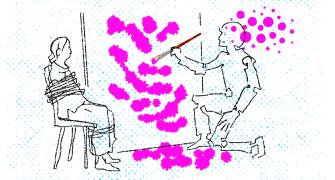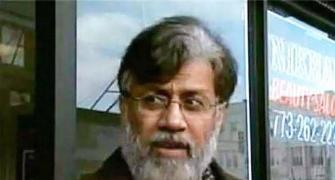I -- also an American -- refuse to use that logic. An expat living in India, I serve as an ambassador of sorts, a representative of the Stars and Stripes. I have pride in my country, in the opportunities it's afforded me, pride in my relatives, poor blue-collar folks, who readily volunteered for military service, to fight in European and Pacific theatres during that horrific world war, military service that would ultimately cut short my maternal grandfather's life.
But I'm conflicted. I'm from Ohio, the state that gifted George W Bush the 2004 election and simultaneously broke half the nation's heart. During my travels abroad, I've been peppered with constant questions: How could you have elected that ignoramus who currently occupies the White House? Why is your corrupt administration supporting Pakistan and not Iran? Are they not both run by extremist, Islamic despots? Why is Saudi Arabia an ally but Syria a foe?
As I fumble for answers, I end up posing additional questions: Has it come to this? In eight years, we've turned the world from America-philes to America-haters? The answer I come to, invariably, is yes.
The Bush years have seen America depart from reason and common sense, preferring to deal in platitudes rather than actualities, preferring straw man arguments to the simple truth. George W was first elected on a platform of education reform, fiscal responsibility and a pledge not to engage in 'nation-building exercises.' With American school children performing increasingly poorly compared to their international peers, a budget surplus that's become a mounting deficit and two ongoing wars, it's clear that George pulled the proverbial wool over our eyes.
But I urge you to understand: America is hurt, America is divided, America is besotted by conflict. Bush won in 2000 by just a few thousands votes, only Florida swung the election in his favour. And I shudder to relive the tragedy of 2004. I vividly remember the sight of dozens of college kids, volunteers for the Kerry campaign, sobbing as the results were announced.
I remember the stories of African Americans in my home city, Cleveland, who were turned back from the booths without reason. How? Why? And so began, for me and many others, disillusionment with national politics. A vague acceptance that the neo-conservatives had hijacked the government and there was nothing that could be done to stop them.
Today, my faith has been restored. In November, a black man will compete in the general election, and according to recent polls, is the favourite to become the 44th President of the United States of America. Given a 300-year-old legacy of slavery, lynching, beatings, discrimination and disenfranchisement, this is no small matter. Our oldest skeleton, stuffed deep into the closet, where it has for centuries gathered dust, is set to be vanquished.
Exclusive: Barack Obama, in his own words, on rediff.com
It's true that the Civil Rights Act of 1964 brought political and legal equality to African Americans. Of course, mere political equality tells but part of the story. Just four years later, in 1968, Reverend Martin Luther King was shot and killed, assassinated by a white supremacist in Memphis, Tennessee. Less than 24 hours before that fateful shot, Dr King had given his famous 'Mountaintop Speech', wherein he presciently told a crowd of African Americans, 'I may not get there with you, but we, as a people, will get to the Promised Land!' (Watch the speech's thunderous conclusion here: http://www.youtube.com/watch?v=o0FiCxZKuv8)
So, 40 years later, has Dr King's promise come to fruition? According to every index that measures standard of living, from education levels, to average income, to incarceration levels, to average life span, blacks lag horribly behind the rest of the country. Though 12% of the United States is African American, just 1% of Fortune 500 CEOs are black. At the political level, they may be even more poorly represented. Right now, there's just one black Senator out of 100, Senator Obama; he too is bi-racial, the son of a Kenyan father and a white mother. And, of course, let us not forget, before 2008 no black man has ever seriously competed for the Presidency.
But the time is now. Now, in the midst of an information revolution. Now, with an increasingly informed and angry citizenry. This year, Democrats came out in droves to vote in the primary elections in staggering, record-setting numbers. This is, in large part, thanks to my peers. The college-aged voters have always been dismissed as a disinterested bloc, a bunch of stoners with big thoughts but no real direction. Now suddenly, they've found a candidate with whom they identify.
Obama's grounded in community activism; he's walked the pavement, worn out the soles of his shoes, developed callused knuckles from all the door knocking; he understands the basic innocence and purity of the America people. His campaign is exposing the fundamental generation gap that divides my country.
Youngsters, it's clear, are voting for Obama. Not only that, they canvass for him, add him to their Facebook and MySpace profiles, and talk about him over coffee and classwork. Should he win, he will be inexorably linked with my generation.
But aside from that, and above all else, I believe in the inherent decency of the American people. We have a horrific history of racial intolerance, but we are ready and willing to change.
My mother, born and raised in rural Virginia, an economically depressed and socially conservative area, is now a proud Obama supporter. When her house burned to the ground as a small child, and one of her dolls was recovered from the ashes, its face was black with soot, its hair burned to little nubs. Rather than comfort her, a neighbour's child instead taunted her, "Haha! You have a dirty nigger doll! Might as well throw it in the trash!" My mother, when evincing her support for Barack, recalls this incident, with tears in her eyes. While it may be true that some will not support a candidate for his race, I wager that just as many consider Obama's heritage a boon, another reason to vote for this decidedly different candidate.
One of the common charges against Barack is that he's "a blank slate", that we "don't really know him." To this, I say poppycock. The man's written two books -- one autobiographical and the other political. Should one want to understand his psyche, read the former. To understand his policy beliefs, read the latter.
I scoff when I'm told that Republican Presidential nominee John McCain has the experience that Obama lacks. McCain's still stuck in the same Cold War politics of the 20th century: Us vs Them, Black vs White, Communism vs Democracy, Christianity vs Islam, Axis of Evil vs the Coalition of the Willing.
I'm ready for a President who understands the nuanced nature of an increasingly globalised world. I'm ready for a President who comprehends the myriad economic, social, political, and yes, religious, overtones that go into our foreign policy formulation. I want a President who can see that one man's terrorist is another's freedom fighter. Obama has said he's willing to engage in diplomacy with political enemies. Isn't that what it's all about, the ethics of compromise, dialogue and empathy?
The key now is for the upstart to show prudence and pragmatism in his vice-presidential candidate selection. For many abroad, it may seem a no-brainer to choose Hillary Clinton, a mere matter of common sense. But look deeper, truly attempt to understand the demographics of America, and one might see a different picture. Americans, especially rural Americans, tend to be a religious, conservative lot. This point is underestimated in the international media. A female President? They can handle; it's time even, they say. A minority President? That too is plausible. But put them together, and the populist backlash might spell disaster.
He should instead choose a candidate who can appeal to those rural, socially conservative voters, someone like former general Wesley Clark. Clark enjoys an impeccable military record, having topped his class at the military's top educational institute, West Point. Not only that, but Clark polls well in the South, where decades old fear, resentment and bigotry might cost Obama vital Electoral College votes. Clark, or someone like him, gives these tentative Obama supporters the reassurance they desperately desire.
There's also a belief that Bush is evil personified, and those who voted for him are his zombie minions. As is usually the case, the situation is far more complex. They might have been misguided, but most of those Bush supporters believed in their hearts they were doing the best thing possible for their nation.
9/11 drastically altered the American mindset, decidedly for the worst. We went from optimistic to paranoid, from believing that anything is possible through cooperation to 'screw them, take care of ourselves first.' And there are real national security concerns, too. God forbid a nuclear bomb should be set off in an American metro, or that Israel or India suffer the same.
And regarding the plight of African Americans, it is true that their neighbourhoods are plagued by violence and crime. It's true that social welfare may have created an ethic of dependency and destroyed the African-American nuclear family, problems that hamper their advancement even today. Right or wrong, the affirmative action programmes that favour black candidates cause resentment in many whites, much the same way I imagine reservation makes Brahmins in India feel.
But ignoring these problems won't make them disappear. Obama, in the wake of the Reverend Wright scandal, gave a fiery speech in Philadelphia that addressed the inherent race issues that still haunt America. Another candidate may have tried to brush the issues under the rug and to the side. That moment clinched it in my mind, that this is America's candidate, that this is America's time. We will stand up and tell the rest of the world, we're not Rome, Britain or any other empire that collapsed into itself, rotten from the core.
So where do we go from here?
At this point, were one to juxtapose McCain's speech from last night with Obama's, the contrast is glaring. One wonders how the conservatives can approach the election, with a candidate so similar to the despised incumbent that he's been nicknamed, 'McSame.' Will they race-bait and play on Obama's name, only one letter removed from public enemy number one, Osama bin Laden?
Republican strategist Karl Rove has in the past been called shrewd and devious, a master of his craft. He famously sank the Kerry campaign with his manipulative swift boat advertisement campaign, which managed to paint Kerry a coward, though the Senator had served and been wounded in Vietnam. This time, it will be interesting to see the colour of the rabbit he pulls from his hat. If it's black, however, I have a feeling he will come up empty.
Matthew Schneeberger is Principal Correspondent, rediff.com







